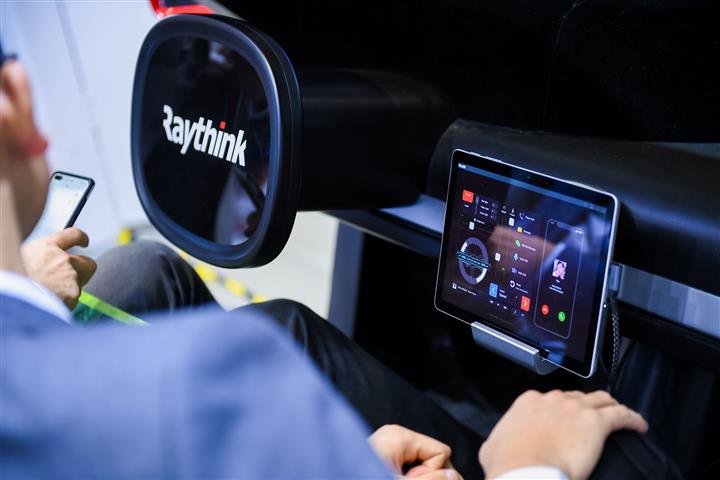 China's Raythink Brings Latest Augmented Reality Heads-Up Displays to Shanghai Auto Show
China's Raythink Brings Latest Augmented Reality Heads-Up Displays to Shanghai Auto Show(Yicai Global) April 23 -- Raythink, the Chinese augmented reality heads-up display maker behind a new generation of virtual screens that are likely to transform the in-car experience in the age of intelligent vehicles, has revealed its latest products at the Shanghai Auto Show.
The Superior W-HUD, which is already in production, as well as the Tri-Lane AR-HUD with wide angle spatial imaging across three lanes and the Mono-Lane Plus AR-HUD, both still in development, were put on public view at the ongoing 19th Shanghai International Automobile Industry Exhibition. People could try them out in a demo vehicle, that has completed one year’s worth of road tests.
AR-HUDs are able to project Advanced Driver Assistance System alerts and navigational cues, such as maps, front collision warning, pedestrian collision warning and lane departure warning, onto a virtual screen that is set beyond the car’s windshield into the driver’s line of sight. The HUDs can interact with and mark real world objects.
The automotive HUD market is estimated to be worth USD866 million this year and USD3.4 billion by 2025, marking a 31.3 percent compound annual growth rate, according to an industry report.
Fast growth in high-end auto segments, increased demand for improved in-car experiences, as well as greater consumer awareness of the need for road and vehicle safety are all likely to spur demand.
Shenzhen-based Raythink ranks among the top three HUD suppliers, said Chief Marketing Officer Paul Yuan. Raythink has already begun cooperation with many carmakers on its Tri-Lane AR-HUD, and is expected to start mass-production in 2023.
The company has already signed up with Irish auto parts supplier Aptiv to promote the use of AR-HUDs in intelligent car cockpits. " Raythink will work with more partners in the future, as AR-HUD is getting more popular among carmakers to improve drivers’ experience." Yuan added.
About 70 percent of cars will be smart connected vehicles in the future, said Qi Zhenggang, vice president of research and development at Hycan, the joint venture between Guangzhou New Energy and electric car startup Nio, but he didn’t specify by when. They will need a third screen as there will be too much data to display on the dashboard. Raythink provides a good solution, he added.
Raythink products can also be applied in rail transit. Its AR-HUD is used in the high-speed rail cockpits of China Railway Signal & Communication Corp.,allowing train conductors to detect foreign objects on tracks earlier than by the naked eyes.
Founded in 2019, Raythink has four research centers, including in Taipei and Bangalore, and two manufacturing sites.
Editor: Kim Taylor